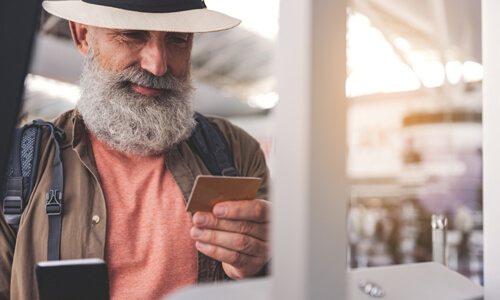Traveling abroad offers exceptional opportunities to experience new cultures, explore world-famous landmarks, try new cuisines and make memories to last a lifetime. However, before you embark on your next overseas adventure, take a few moments to be sure you’ll always have access to your cash, and the means to keep your money secure and accessible.
Know how to access your cash abroad.
Regardless of your destination, maintaining access to your cash and credit/debit cards overseas is essential. From daily expenses such as dining and taxi fare to more expensive nights out on the town or shopping sprees, here are some tips to enjoy uninterrupted access to your cash:
- Contact your financial institution before departing: Have you informed your financial institution of your travel plans? If not, your overseas credit card or debit card purchases will likely trigger fraud alerts and may cause an interruption in access to your funds. A quick note to customer service could help you to avoid this frustrating experience.
- Purchase a small amount of foreign currency before your trip; withdraw a larger sum from a secure ATM: Some vendors in EU countries may accept U.S. currency. However, if your travel plans include Latin America, prepare to leave your dollars at home. Since there’s no guarantee you’ll be able to locate an ATM immediately upon your arrival, try to secure some foreign currency before your trip. You may pay a premium fee and receive a poor exchange rate at an Exchange Desk (typically located in an airport or train station); however, a small amount of foreign cash on hand can help cover taxi fare, baggage handler tips and more until you find a secure ATM to withdraw a larger sum.
- Carry emergency cash. If your money is lost or stolen, you’ll need immediate access to emergency funds to return to your hotel or other safe location. Always store this emergency money separate from your daily-use cash and credit cards. To avoid needlessly changing large sums back into dollars for the return trip home, be sure to carefully manage how much foreign currency you’ll need.
Minimize foreign transaction and currency exchange fees.
Have you considered the impact foreign transaction fees may have on the cost of your overseas purchases? Many financial institutions charge up to a 3 percent fee on all purchases made outside of the U.S. Over the course of a one- or two-week excursion abroad, this can add up. To avoid these surcharges, shop around for a credit or debit card that charges less than the standard 3 percent (Quorum’s foreign transaction fee is 1%).
In addition to transaction fees, it pays to know the exact exchange rate between the U.S. dollar and your overseas travel destinations’ currency. Knowing the exchange rate will not only help ensure you are not scammed when exchanging currency but will help you maintain perspective on the actual cost of purchasing goods and services in the local currency.
How to avoid scams and keep your money safe internationally.
Now that you have a plan in place to maintain uninterrupted access to funds, and avoid excessive transaction fees or inaccurate exchange rates, practice a few safety measures. Thieves all over the world are clever and will try to separate you from your hard-earned money. Pay attention to your surroundings at all times and follow the tips below:
- Access an ATM at a safe location: Once you arrive at your destination, locate a secure ATM at an airport or a terminal attached to a financial institution. Avoid free-standing ATMs as they are often targeted by thieves who will either attempt to skim your card or place surveillance equipment and record your PIN number and other account information.
- Never display cash in public: To the greatest extent possible, it is best to avoid counting your money in public or pulling out large sums when making purchases. Instead, rely on trips to the restroom or other private location, behind a locked door, to take inventory of your cash. It is also a good idea to keep some bills and coins in an easily accessible location to pay for small purchases such as snacks and drinks.
- Foil pickpockets: Regardless of your travel destination, rest assured that pickpockets are present. Beware of strangers suddenly bumping into you or attempting to distract you when you are in a crowd. Many pickpockets work in pairs. One distracts you while the other extracts money from your backpack, purse or pocket. Avoid this by keeping your valuables hidden and place your wallet and phone in a front pants pocket, if possible. Women should take care to keep purses closed, buckled, zipped and hanging in front of the body.
- Take caution when hailing a taxi: Beware of dishonest taxi drivers who will try to inflate the cost of your ride or pretend not to have change for large bills. Avoid this common hustle by carrying small bills and coins and always negotiate prices before you get into the vehicle.
How to safely use your phone abroad.
When you’re traveling abroad, the last thing you want are expensive fees for data, calls, and texts that may come up. Here are a few ways to make sure your international charges aren’t comparable to the final cost of your vacation:
- Buy an international pass.The majority of carriers will allow you to purchase some sort of short-term plan either by day or month. This will help you determine what international charges will actually cost rather than getting hit with surprise fees after your trip.
- Connect to Wi-Fi.When you’re at your hotel or another place with free wireless internet, connect your phone to its network. You can then browse the internet, use your travel apps, and even make calls and texts at no charge. (Remember: avoid using public Wi-Fi for banking or any other transaction that contains sensitive information.)
- Get a foreign pre-paid SIM card.A SIM (Subscriber Identity Module) card is a plastic card that goes inside any phone that uses Global System of Mobile Communications (GSM). If your phone is compatible with GSM (you can check here), and unlocked (check with your provider if you can switch between different SIM cards), you can purchase a foreign SIM card online or at the airport to use in your phone temporarily.
With just a little prudent pre-planning focused on maintaining access to your cash, securing your money and avoiding scams, you will be free to enjoy your much-needed vacation and take in the sights, sounds and tastes of your foreign travel destination!






Comments Section
Please note: Comments are not monitored for member servicing inquiries and will not be published. If you have a question or comment about a Quorum product or account, please visit quorumfcu.org to submit a query with our Member Service Team. Thank you.